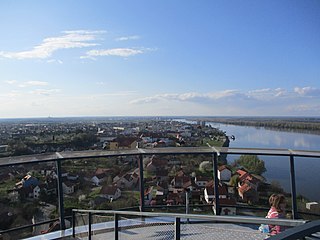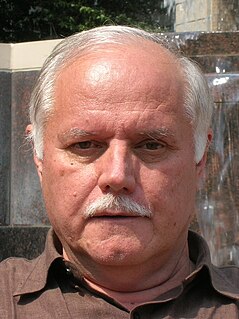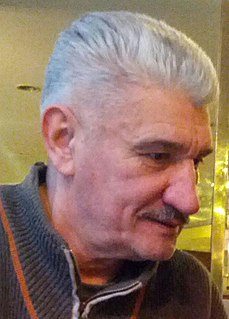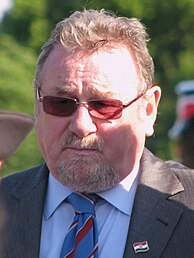
Vukovar is a city in Croatia, in the eastern region of Slavonia. It contains Croatia's largest river port, located at the confluence of the Vuka and the Danube. Vukovar is the seat of Vukovar-Syrmia County and the second largest city in the county after Vinkovci. The city's registered population was 22,616 in the 2021 census, with a total of 23,536 in the municipality.
Feral Tribune was a Croatian political weekly magazine. Based in Split, it first started as a political satire supplement in Nedjeljna Dalmacija before evolving into an independent satirical weekly in 1993. It became a popular political weekly in the 2000s before ceasing publication in June 2008.

Branimir Glavaš is a Croatian former major general and right-wing politician. He was one of the founders of the Croatian Democratic Union (HDZ) party which was in power in the 1990s and one of its key figures until a split in 2006. In 2009 he was found guilty of war crimes.

Kemal Kurspahić was a Bosnian journalist. He was managing editor of The Connection Newspapers in Alexandria, Virginia and founder of the media in Democracy Institute, dedicated to promoting higher standards in journalism in post-conflict societies and countries in transition to democracy. He won broad international recognition as the Editor-in-Chief of the Bosnian daily Oslobođenje in Sarajevo, 1989-1994.
The Battle of Borovo Selo of 2 May 1991, known in Croatia as the Borovo Selo massacre and in Serbia as the Borovo Selo incident, was one of the first armed clashes in the conflict which became known as the Croatian War of Independence. The clash was precipitated by months of rising ethnic tensions, violence, and armed combat in Pakrac and at the Plitvice Lakes in March. The immediate cause for the confrontation in the heavily ethnic Serb village of Borovo Selo, just north of Vukovar, was a failed attempt to replace the Yugoslav flag in the village with the flag of Croatia. The unauthorised effort by four Croatian policemen resulted in the capture of two by a Croatian Serb militia in the village. To retrieve the captives, the Croatian authorities deployed additional police, who drove into an ambush. Twelve Croatian policemen and one Serb paramilitary were killed before the Yugoslav People's Army (JNA) intervened and put an end to the clashes.
South East Europe Media Organisation (SEEMO) is a regional non-governmental, non-profit network of editors, media executives and leading journalists in Southeast, South, East and Central Europe. The organization aims to create a bridge between international media activities and the media developments in the region. It has headquarters and national committees in several countries. In total 33 member states or territories are included in SEEMO: Albania, Armenia, Azerbaijan, Belarus, Bosnia-Herzegovina, Bulgaria, Croatia, Cyprus, Czech Republic, Estonia, Georgia, Greece, Hungary, Kazakhstan, Kosovo, Kyrgyzstan, Latvia, Lithuania, Malta, Moldova, Montenegro, North Macedonia, Poland, Romania, Russia, Serbia, Slovakia, Slovenia, Tajikistan, Turkmenistan, Turkey, Ukraine and Uzbekistan

Davor Domazet-Lošo is a Croatian politician, writer, and a retired admiral of the Croatian Navy.

Vladimir Šeks is a Croatian lawyer and politician. He has been a representative in the Croatian Parliament since the nation's independence, and has held the posts of the Speaker of the Parliament, as well as Deputy Prime Minister in the government. He also served as acting President of the Croatian Democratic Union and Leader of the Opposition from 5 January to 30 April 2000.
The Lovas killings involved the killing of 70 Croat civilian residents of the village of Lovas between 10 and 18 October 1991, during the Croatian War of Independence. The killings took place during and in the immediate aftermath of the occupation of the village by the Yugoslav People's Army (JNA) supported by Croatian Serb forces and Dušan Silni paramilitaries on 10 October, two days after Croatia declared independence from Yugoslavia. The occupation occurred during the Battle of Vukovar, as the JNA sought to consolidate its control over the area surrounding the city of Vukovar. The killings and abuse of the civilian population continued until 18 October, when troops guarding a group of civilians forced them to walk into a minefield at gunpoint and then opened fire upon them.
Tomislav Merčep was a Croatian politician and paramilitary leader during the Croatian War of Independence who was later convicted of war crimes.
The Battle of Osijek was the artillery bombardment of the Croatian city of Osijek by the Yugoslav People's Army (JNA) which took place from August 1991 to June 1992 during the Croatian War of Independence. Shelling peaked in late November and December 1991, then diminished in 1992 after the Vance plan was accepted by the combatants. Airstrikes and attacks by JNA infantry and armored units against targets in the city accompanied the bombardment, which caused approximately 800 deaths and resulted in a large portion of the city's population leaving. Croatian sources estimated that 6,000 artillery shells were fired against Osijek over the period.

Ivan Vekić was a Croatian politician and lawyer. He was one of the founders of the Croatian Democratic Union and served as the Croatian Minister of Interior during the Croatian War of Independence.
The Open Letter on the Position and Status of Serbs in Croatia was sent to the addresses of prominent Croatians and Serbians in September 2008. The letter spoke about the adverse social and economic circumstances in which Croatian Serbs had lived.
The Paulin Dvor massacre was an act of mass murder committed by soldiers of the Croatian Army (HV) in the village of Paulin Dvor, near the town of Osijek on 11 December 1991 during the Croatian War of Independence. Of the nineteen victims, eighteen were ethnic Serbs, and one was a Hungarian national. The ages of the victims, eight women and eleven men, ranged from 41 to 85. Two former Croatian soldiers were convicted for their role in the killings and were sentenced to 15 and 11 years, respectively. In November 2010, Croatian President Ivo Josipović laid a wreath at the graveyard of the massacre victims and officially apologized for the killings.
The Croatian War of Independence has been the subject of a number of feature films and documentaries. Those include:

The border between Croatia and Serbia in the area of the Danube is disputed. While Serbia holds the opinion that the thalweg of the Danube valley and the centerline of the river represents the international border between the two countries, Croatia disagrees and claims that the international border lies along the boundaries of the cadastral municipalities located along the river—departing from the course at several points along a 140-kilometre (87 mi) section. The cadastre-based boundary reflects the course of the Danube which existed in the 19th century, before meandering and hydrotechnical engineering works altered its course. The area size of the territory in dispute is reported variously, up to 140 square kilometres.

Darko Hudelist is a Croatian journalist, non-fiction writer and researcher of contemporary history.
Drago Carlos Pilsel is an Argentine Croatian journalist and human rights activist.
The 1991 killings of Serbs in Vukovar were a series of incidents in which Serbs living in and around Vukovar during the spring and summer of 1991 were subject to kidnappings and summary executions by armed thugs associated with the Croatian National Guard. These events began as the Croatian War of Independence was starting, prior to the start of the Battle of Vukovar in August of the same year. After the war, some criminal investigations were undertaken, including one of the notable perpetrators Tomislav Merčep, though on the whole the matter remains largely unresolved.








